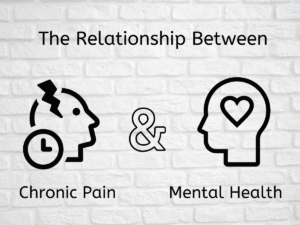The Relationship Between Chronic Pain and Mental Health
Chronic pain can bring about many challenges. It can be a heavy burden to carry, and many people who have chronic pain also come to experience mental health challenges such as anxiety and depression. Does this mean that chronic pain and mental health are linked? Does the presence of one bring about the other? Are there ways to manage the symptoms of both chronic pain and mental illness?
It’s important to distinguish the difference between acute pain and chronic pain. Acute pain is present from a few days up to two weeks. Chronic pain, on the other hand, is persistent and lasts for months, even years. Some people experience chronic pain in periods, while others can feel it continuously without a break. For some, it can be debilitating to the point that they have difficulty performing daily activities. It can also be a huge challenge for those with chronic pain to maintain a good sleep pattern because the pain can interrupt their sleep and its quality. The aches can keep individuals up at night, and the lack of sleep can further exacerbate the levels of pain felt and invariably impact mood.
The issues and challenges that come with chronic pain can take a toll on a person’s state of mind. Chronic pain can bring about both physical and emotional stress, and this can alter stress hormones and neurochemicals in the brain and nervous system. These changes can affect a person’s mood, which in turn can develop into anxiety and/ or depression. A vicious cycle ensues, which makes pain and mental health management extremely important. There is a bidirectional relationship between psychiatric illnesses and chronic pain. This means that pain can cause depression and depression can increase pain. Chronic pain can even lead some at-risk individuals who over-medicate to alleviate the pain to develop substance abuse problems. This is why it is crucial that patients with chronic pain and mental health challenges have a follow-up with the appropriate physician with pain expertise.
According to Dr. Leon Tourian, Associate Professor in the Department of Psychiatry at McGill University and psychiatrist at the MUHC Alan Edwards Pain Management Unit, there is a lot of research that shows that psychiatric and pain disorders overlap and interact with one another. As a guest on the podcast PsychEd, Dr. Tourian explained that there is a bidirectional relationship between pain and psychiatric illnesses. The more medical comorbidities that an individual has, the higher chances they have of developing risks that lead to issues like depression. He elaborates that the regions of the brain that control pain, mood (including anxiety, depression, and mood in general), and cognition are the same regions (they have the same breaker – like an electrical panel). The “limited resource theory” suggests that if you overload one of these circuits (either pain, mood, or cognition), the others will become more vulnerable. This can demonstrate how there is a relationship between pain and mental health.
The Canadian Mental Health Association explains that people who live with a more serious mental health issue have a higher risk of developing a chronic physical condition, and those with chronic conditions are twice as likely to experience depression and anxiety when compared to the general population. This shows that although not everyone will develop both at the same time, it is a strong possibility nonetheless.
Psychiatry can have an important role in the management of both pain and mental health. Psychiatrists can help support patients in these situations to enjoy a bet- ter quality of life. There are specific medications they can prescribe to manage both chronic pain and mental illness, but Dr. Tourian suggests that there are also other ways to manage the symptoms. Some additional therapies that can be complimented with medication include cognitive behavioural therapy and acceptance and commitment therapy. Meditation and mindfulness are also great tools, as they can give the individual a sense of regaining some sort of control over their body and mind, which is often lost in patients dealing with chronic pain. Dr. Tourian also suggests that cannabis can help alleviate some pain. Although there needs to be more research on the role of cannabinoids in the management of chronic pain and neuropathic pain, there is evidence that shows it does help. Harvard Health Publishing also suggests hypnosis as an alternative method of pain management. Additionally, the Mayo Clinic suggests pain rehabilitation programs that include both medical and psychiatric aspects.
When it comes to the treatment of chronic pain and mental health, balance is key. Whether you use one type of treatment over another, or combine several, you must find what fits best for you and what alleviates symptoms for your well-being. Chronic pain is invisible but the suffering it causes patients and their families is very real. The more we talk about it, the less pain patients will be stigmatized and the better they will be understood and cared for.
– Gabrielle Lesage
If you or a loved one experiences chronic pain and would like additional support, visit the MUHC Alan Edwards Pain Management Unit and l’Association Québécoise de la douleur chronique. For resources on various mental illnesses, visit AMI-Québec’s resource list.
Click here for references



